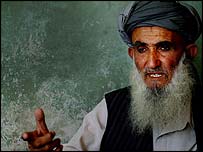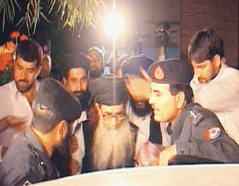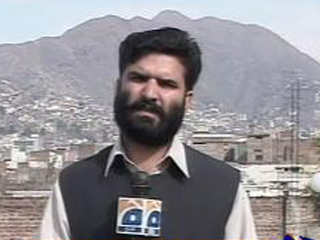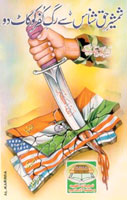In Pakistan ist eine heftige Debatte entbrannt über die Strategie der Regierung, einen Deal mit den Taliban zu machen. Auf der erfreulicher Weise grundüberholten Website der Zeitung Dawn (Karatschi) kann man sich davon ein Bild machen.
Dies ist der Mann, mit dem die Regierung in Islamabad sich nun arrangiert hat: Maulana Sudi Mohammad. Er führt dieTehreek-e-Nafaz-e-Shariat-e-Mohammadi an – die „Bewegung zur Durchsetzung islamischer Gesetze“ (was ja nun auch gelungen ist).

Im letzten Frühjahr wurde Sufi Mohammad aus dem Gefängnis entlassen, in das ihn die Musharraf-Regierung gesteckt hatte. 2001 hatte er von Pakistan aus die afghanischen Taliban untertsützt.

I.A.Rehman, ein bekannter Kolumnist und Menschenrechtsaktivist, hält weitere Deals mit den taliban für die einzige Lösung. Doch er hat große Furcht vor den Folgen für ganz Pakistan:
As things stand, the US’s ability to win the new Afghan war in coming years seems doubtful. Neither the USPakistan will be buffeted by almost irresistible storms. nor Nato has an exit strategy. Only two possibilities emerge: either the messy war will continue for another decade, or the Taliban will be brought into the ruling coalition which they will eventually dominate. In either case,
If fighting continues in Afghanistan, militants from the tribal areas keep up their fight there alongside the Taliban. Consequently, militancy in Pakistani territories would grow. The US pressure on Islamabad to fight the extremists and the latter’s inability to comply could strain relations to a breaking point. In that event, the survival test for Pakistan would be tough.
If Taliban of any hue come into power in Afghanistan, the pressure on Pakistan to allow a similar dispensation in the Frontier region will increase manifold. Even now, the tribal areas are not prepared to merge with the NWFP. In future, they may claim freedom to join Pakistan or Afghanistan, and in the latter case, they may well want to take NWFP along – a possibility many Pakhtuns may not choose to resist.
Whatever happens in Afghanistan, Pakistan will face in FATA and perhaps the NWFP a situation that resembles the present US predicament. The Pakistan Army may have the capacity to lay the territory to waste while killing hordes of people, but it will not – and cannot – do that. For one thing, the army will risk its unity if it strikes out against ideological allies and, for another, the state will be overwhelmed in the aftermath of an unwelcome war.
The sole option will be to buy a truce by separating the Shariah lobby from the terrorists and creating FATA and PATA as a Shariah zone, which may quickly encompass the Frontier province. The question then will be whether Pakistan can contain the pro-Shariah forces within the Frontier region.
Dagegen schreibt Shaheen Sardar Ali, der zur zeit in England lehrt, dass das Arrangement eine Missachtung des demokratischen willems der Mehrheit sei, die auch im Swat-Tal g e g e n die religiösen Parteien gestimmt habe:
Now, once again the spectre of Sufi Mohammad rises over the mountains of Timergara wooed by the NWFP government as the vehicle for peace in Swat and the region of Malakand. A few basic questions demand answers. Are the people of Swat and Malakand a different breed of Muslims to the rest of the province and the country? One hopes not. If we are all God-fearing Muslims and if Sharia as defined by Sufi Mohammad et al, is the only way forward for peace and prosperity, then ought we not, as a country, embrace it? Why try it out only in Malakand; why not simultaneously in Islamabad, Lahore, Karachi and Multan?
Democracy and the will of the people carries no meaning if gun-toting individuals can legitimately take over a population. Members of the national and provincial assemblies are of no further relevance in Swat and Malakand and must resign from office forthwith. After all, the NWFP government has found its counterparts in power and governance in non-state actors who apparently represent the will of the people. That the people of Swat out-voted members of religious parties and voted in the ANP appears to be lost on the government of the ANP itself.
(Beide Stücke sind auf der Dawn-Website zu finden. Leider funktionieren direkte Links nicht.)






